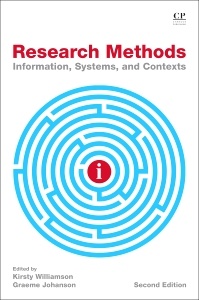Research Methods (2nd Ed.) Information, Systems, and Contexts
Coordonnateurs : Williamson Kirsty, Johanson Graeme

Research Methods: Information, Systems, and Contexts, Second Edition, presents up-to-date guidance on how to teach research methods to graduate students and professionals working in information management, information science, librarianship, archives, and records and information systems. It provides a coherent and precise account of current research themes and structures, giving students guidance, appreciation of the scope of research paradigms, and the consequences of specific courses of action. Each of these valuable sections will help users determine the relevance of particular approaches to their own questions. The book presents academics who teach research and information professionals who carry out research with new resources and guidance on lesser-known research paradigms.
Section I Foundations and Framing 1. Research concepts 2. The fundamentals of research planning 3. Information research: Patterns and practice 4. Archival and recordkeeping research: Past, present and future 5. The methodological landscape: Information systems and knowledge management
Section II Research Methods 6. Survey designs 7. Case study research in information systems 8. Action research: Theory and practice 9. Constructivist grounded theory: A 21st century research methodology 10. Bibliometric research 11. Design-science research 12. Researching history 13. Ethnographic research 14. Experimental research
Section III Research Techniques 15. Populations and samples 16. Questionnaires, individual interviews and focus group interviews 17. Observation 18. Quantitative data analysis 19. Qualitative data analysis
Section IV Research Practice and Communication 20. Ethical research practices 21. Managing research data 22. Research writing and dissemination
Section V Information Research: Reflections on Past and Future 23. The future of information research
Research students, researchers, academics involved in teaching research, information professionals in higher education, research, and corporate libraries working alongside researchers, or carrying out independent research
Graeme Johanson is Director of the Centre for Community Networking Research at Monash University. He has undertaken academic research for 45 years, and his research findings are widely published. He has supervised many research projects, mainly about the evaluation and use of information and communications technologies for the benefit of developing countries and marginalised groups of people. His initial interest in archives, historical documents, and oral history led him to work as a librarian in research institutions for ten years before becoming an academic focusing on information management and community informatics.
- Provides up-to-date knowledge of research methods and their applications
- Provides a coherent and precise account of current research themes and structures through chapters written by authors who are experts in their fields
- Helps students and researchers understand the range of quantitative and qualitative approaches available for research, as well as how to make practical use of them
- Provides many illustrations from projects in which authors have been involved, to enhance understanding
- Emphasises the nexus between formulation of research question and choice of research methodology
- Enables new researchers to understand the implications of their planning decisions
Date de parution : 11-2017
Ouvrage de 622 p.
19x23.3 cm
Thème de Research Methods :
Mots-clés :
Action inquiry; Action research; Analysis techniques; Applied professional research; Approaches; Archival education; Archival research infrastructure; Archival research methodologies; Archival research methods; Archives; Authorship; Autoethnography; Bibliometric indicators; Bibliometric laws; Bibliometric research; Bibliometrics; Big data; Books; Broad survey types; Broad types of survey; Case study; Case study research; Category coding; Citation analysis; Coding; Collaborative research; Community; Conducting case study; Conducting case study research; Constructivist grounded theory; Contemporary archival; Content analysis; Critical paradigms; Critical theory; Data analysis; Data cleaning; Data collection; Data management; Data-collection technique; Democracy; Democratic management; Descriptive statistics; Design science; Design-science methodology; Design-science theory; Designing case study; Designing case study research; Developing research questions; Developing theory; Development; Dispersion; Enterprise resource planning; Ethical behaviour; Ethnography; Evidence; Experiment; Experimental and control groups; Experimental designs; Experiments; Exploration; Field experiments; Forms; Frameworks; Future information research; Grounded theory; Historical developments; History; Hot-house; Human information behaviour; Human rights; Hypotheses; Hypothesis development; Hypothesis use; Individual interviews; Inferring causation; Information in organisations; Information literacy; Information management; Information research; Information seeking; Information systems; Information systems artefact; Information technology; Interpretive; Interpretive paradigms; Interpretivism; Interviews; Investigation; Journals; Knowledge management; Laboratory experiment; Laboratory experiments; Landscape; Literature; Literature reviews; Management; Memo writing; Meta-theoretical assumptions; Methodological landscape; Methodology



